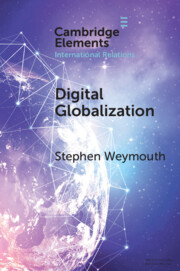Element contents
Digital Globalization
Published online by Cambridge University Press: 04 May 2023
Summary
Keywords
- Type
- Element
- Information
- Online ISBN: 9781108974158Publisher: Cambridge University PressPrint publication: 01 June 2023
References
- 23
- Cited by

